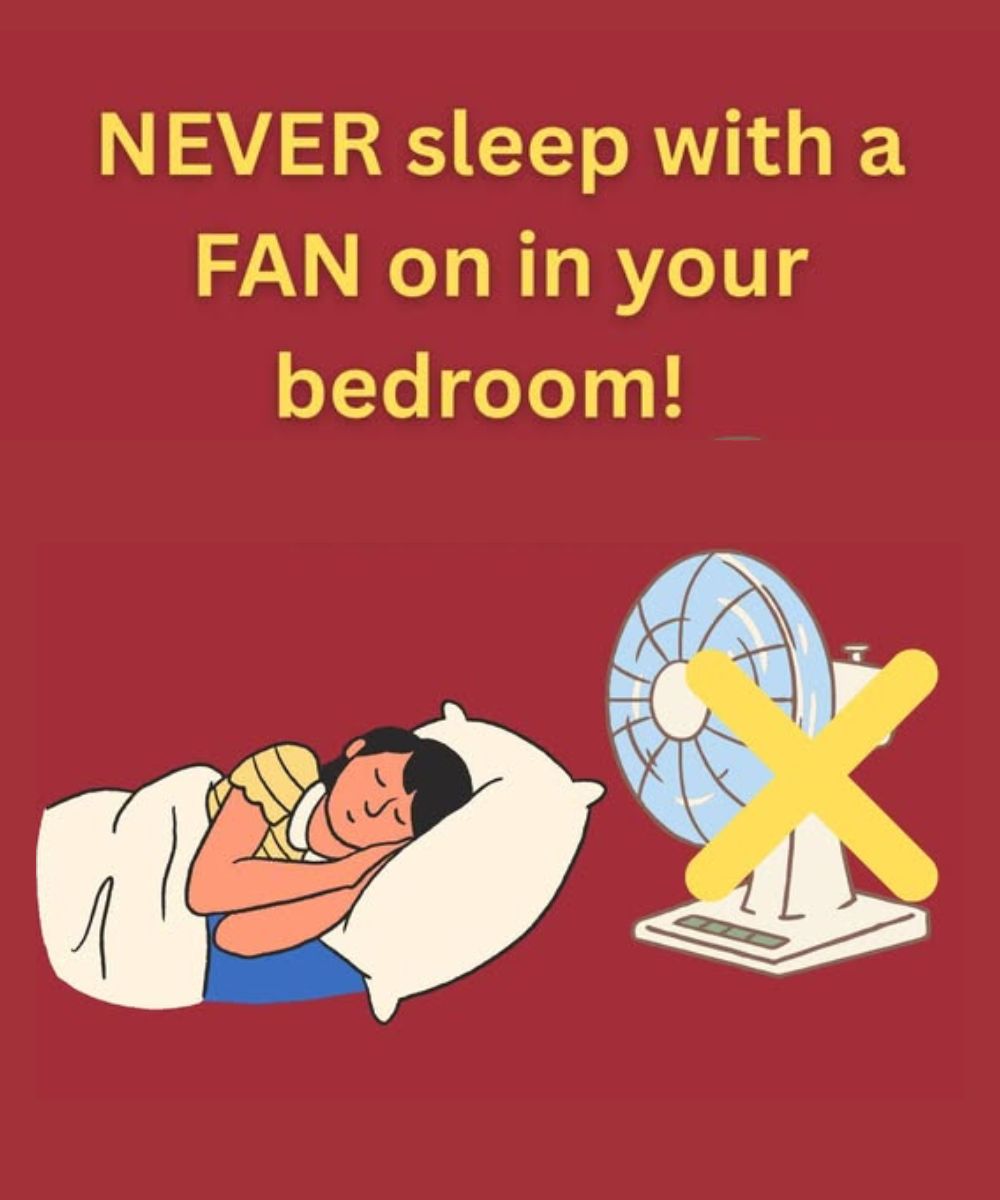
There’s nothing quite like the comfort of a cool breeze on a warm night. Many people rely on fans to sleep better, keeping the air moving and the temperature pleasant. But while that gentle hum might lull you to sleep, you may not realize what’s happening to your throat throughout the night.
Sleeping with a fan directly blowing on you — especially on your throat — can lead to several hidden side effects. Some are merely uncomfortable, while others could cause lasting irritation or even worsen certain health conditions.
Let’s explore what actually happens when you sleep with a fan blowing on your throat, and how to protect yourself while still enjoying a cool night’s rest.
1. Dry Throat and Mouth
One of the most common effects of sleeping with a fan is waking up with a dry, scratchy throat.
Fans circulate air, but they also circulate dust and pull moisture away from your body. If that airflow is directed at your face or throat for several hours, it can dry out your mucous membranes — the thin layers of tissue that line your mouth, nose, and throat.
A dry throat doesn’t just feel uncomfortable. It can also cause mild inflammation and make swallowing painful. Over time, chronic dryness can even make you more vulnerable to infections because your mucous membranes act as the body’s first line of defense against bacteria and viruses.
2. Increased Risk of Sore Throats and Morning Hoarseness
Have you ever woken up with a raspy voice or that “lump in your throat” feeling after sleeping with a fan on? That’s not your imagination.
The cold, dry air can irritate the tissues in your throat, especially your vocal cords. When they lose moisture, they become less flexible, making it harder for them to vibrate properly. This leads to hoarseness, tightness, and soreness that can last all day.
For people who use their voice frequently — singers, teachers, or call center workers — this repeated irritation can lead to vocal strain or even minor inflammation of the vocal cords.
3. Worsened Allergy and Asthma Symptoms
Fans don’t just move air — they move everything in the air.
If there’s dust, pollen, pet dander, or mold particles in your room, your fan will circulate them continuously while you sleep. When the air is directed at your face and throat, those irritants can easily enter your respiratory tract.
The result? You wake up coughing, sneezing, or feeling congested. If you have allergies or asthma, sleeping with a fan can make your symptoms worse, triggering coughing fits, wheezing, or difficulty breathing during the night.
Even if you don’t suffer from chronic allergies, a fan blowing dust into your mouth and nose for hours can still irritate your throat and nasal passages.
4. Muscle Stiffness and Sinus Pressure
It’s not just your throat that’s affected. Constant cold air can cause muscles — especially in your neck and shoulders — to tense up overnight.
If you often wake up with a stiff neck after sleeping with a fan, the airflow might be the culprit. Your body naturally cools down during sleep, but direct exposure to cold air can cause localized cooling, leading to muscle tension and soreness.
Moreover, the cold air can cause your nasal passages to dry out and swell slightly, leading to morning sinus pressure, headaches, or that heavy feeling behind your eyes.
5. Increased Risk of Respiratory Infections
When your throat and nasal passages dry out, your body’s natural defenses are weakened. Normally, mucus traps bacteria and viruses, keeping them from entering deeper into your respiratory system.
But with dry air from a fan blowing on you all night, that protective barrier thins out. As a result, viruses and bacteria can enter more easily, increasing your chances of catching a cold or sore throat infection — especially during the cooler months when your immune system may already be compromised.
6. Impact on Sleep Quality
Many people believe sleeping with a fan helps them sleep better — and in some ways, it does. The gentle white noise and steady airflow can make the environment feel more comfortable.
However, if the fan is too strong or directed at your throat, your body might react subtly throughout the night. Your muscles may tense up in response to the cold air, or your throat may dry out, leading to micro-awakenings (tiny interruptions in your sleep cycle that you may not even remember).
This can leave you feeling less rested, even if you think you slept through the night.
7. How to Protect Your Throat While Using a Fan
If you love sleeping with a fan — don’t worry, you don’t have to give it up entirely. You can take a few simple steps to minimize the risks:
✔️ Adjust the fan’s direction:
Never aim the fan directly at your face or throat. Instead, point it toward the wall or ceiling so the air circulates gently around the room.
✔️ Use a humidifier:
Pairing your fan with a small humidifier can help balance the air’s moisture level and keep your throat from drying out.
✔️ Keep your fan clean:
Dust buildup on fan blades can easily circulate allergens. Clean the blades and grill regularly to reduce dust in the air.
✔️ Stay hydrated:
Drink plenty of water before bed and when you wake up to counteract dryness caused by airflow.
✔️ Try a fan with a timer:
Let it run for just the first few hours of the night. Once your room cools down, you can sleep comfortably without the fan blowing all night long.
8. When to See a Doctor
If you notice your throat is consistently sore, you wake up hoarse often, or you experience breathing issues at night, it may be time to see a doctor. Chronic dryness and irritation can sometimes mask underlying issues like sleep apnea, acid reflux, or allergies.
Also Read : Our Meddling Neighbor Got Our Cars Towed from Our Own Driveway—She Paid a Great Price in Return
A medical professional can rule out these conditions and recommend the best way to manage your symptoms while maintaining your sleep comfort.
🌙 Final Thoughts
Sleeping with a fan can be soothing, especially on hot nights — but when it’s aimed at your throat, the consequences can sneak up on you. From dryness and soreness to allergies and muscle tension, that cool breeze may be doing more harm than good.
The key isn’t necessarily to stop using your fan, but to use it wisely. Position it properly, keep it clean, and balance the humidity in your room.
After all, a good night’s sleep should leave you refreshed — not reaching for a glass of water and rubbing your sore throat in the morning.




2 thoughts on “The Hidden Effects of Sleeping With a Fan on Your Throat — What You Should Know Before Bedtime”